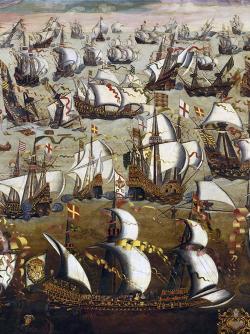Will Christianity Conquer Terrorism?
It seems that no place is entirely safe from violence and terrorism. The memory of September 11, 2001 remains a painful scar on the national consciousness of the United States, but terrorism is a worldwide problem. In 2004, Madrid, Spain, experienced horrific train bombings that killed nearly 200 and injured 2,000 more. In 2007, dual bombings in Iraqi markets ripped apart 800 victims and injured about 1,500 more. In 2016, an ISIS-claimed attack killed 29 at a Bangladeshi café. ISIS-linked fighting rages in Mindanao, Philippines. Boko Haram has terrorized Nigeria for years. Countries throughout the Middle East and Africa have been wracked by almost-nonstop war and violence for generations.
This past February, a machete-wielding terrorist attacked a soldier at the Louvre. In April, a terrorist drove a truck into a crowd in Sweden, a suicide bomber killed 15 and injured 45 in St. Petersburg, Russia, and a terrorist struck Paris again, shooting three police officers and a civilian on the Champs-Elysees. Then, a suicide bombing killed 23 and injured 250 at a music concert in Manchester, England. Soon after, another attack shook England: eight were killed and 48 were injured when terrorists drove a van into pedestrians on London Bridge and then chased and stabbed those who fled.
There were more than 530 recorded terrorist attacks across the globe by the summer of 2017, not including the hundreds of thousands killed each year in local and regional wars. While crime and war know no national boundaries, the perpetual conflict in the Middle East—and the terrorism it spawns—continues to be a source of global concern, and a cause of massive migration to Europe, unlike anything the West has seen for centuries.
As the world daily faces violence, war and terrorism, we are confronted with sobering questions. Are we doomed to a future of violence without end? Will Islam and the West grapple in conflict forever? Will violence and terrorism drive the world toward World War III and Armageddon?
The problems in the Middle East are age-old conflicts among people, ethnicities, and religions, and the violence that these conflicts breed has remained beyond human solution. Scripture reveals that the Middle East, and Jerusalem in particular, will be the focal point for worldwide conflict leading up to the return of Jesus Christ (Daniel 11:40–43; Zechariah 12).
Scripture Reveals Why Terrorism and War!
Why is there so much terrorism and violence? And where will it lead? The reality is that the “god of this age” is Satan the Devil (2 Corinthians 4:4). Satan is the driving force behind hatred and conflict (John 8:44; James 4:1–7). And Scripture reveals that, leading up to Christ’s return, both ethnic and national conflicts will increase—driving people and nations toward World War III. But Scripture also reveals hope beyond the conflict.
Key insight is found in Matthew 24. Here, Jesus reveals that before His Second Coming, violence and wars will increase, with nation rising against nation and kingdom against kingdom (vv. 6–7). As we have explained in previous issues of Tomorrow’s World, the inspired Greek word for “nation” in verse 7 is ethnos, and refers to a people, race or ethnic group; whereas the Greek word for “kingdom” is basileia, which refers to a political state. Jesus Christ is making it clear that at the end of this age there will be increased violence between both political states and ethnic groups.
Jesus then highlights a fact about the state of society at the end of the age: “But as the days of Noah were, so also will the coming of the Son of Man be” (Matthew 24:37). People during the days of Noah went about their daily lives, rejecting Noah’s warning of their impending doom (2 Peter 2:5). The Bible also reveals that at that time, “the wickedness of man was great in the earth, and every intent of the thoughts of his heart was only evil continually” (Genesis 6:5)—and that the world was “corrupt… and filled with violence” (v. 11). This sobering foreshadow of end-time society is echoed elsewhere in Scripture. For example, 2 Timothy 3:1–9 describes the last days as a “perilous” and godless age with people who have become “brutal” (v. 3)—as we increasingly see in the news today!
While societal attitudes and conflicts will intensify, the Bible also identifies who the international end-time players will be. For example, Psalm 83 predicts an end-time Arab confederation, allied—however temporarily—with Assyria (Germany), that will seek to destroy Israel, which includes not just the modern Jewish state called Israel, but also the American and British-descended peoples. (For proof of this, request our free booklet The United States and Great Britain in Prophecy.) The “intent” of this alliance corresponds with what Isaiah 10:5–6 and elsewhere reveals about the deeds of the end-time German-led European empire—it will be the tool of God’s punishment on the nations of modern Israel, leading to “the time of Jacob’s trouble” (Jeremiah 30:7).
God reveals through Daniel a next phase in this coming World War III. Scripture says that the Arab empire, called the “king of the South” in Daniel, will attack the European empire, the “king of the North,” resulting in a rapid counter-attack, finally overwhelming the southern empire, including the lands of the Egyptians, Ethiopians and Libyans (Daniel 11:40–43). But the conflict does not conclude there! As Daniel 11:44 reveals, great eastern powers will then enter the conflict, pushing the world to the brink of annihilation. Only the return of Jesus Christ will save humanity.
Christ Will Conquer War and Terrorism
The world may be spiraling into violence, but Christians strive to face the future with faith and confidence (Hebrews 4:16; 1 John 4:16–18)! They claim the promise that nothing can separate them from the love of Christ—“tribulation, or distress, or persecution, or famine, or nakedness, or peril, or sword” are not stronger than God’s love for His people. And in this faith, through the strength of Christ in them, Christians can be true conquerors: “Yet in all these things we are more than conquerors through Him who loved us” (Romans 8:35–37).
As Christians see hatred and violence intensify, they also understand that they should never repay evil for evil. Instead, they are commanded to love their enemies (Luke 6:35) and be peacemakers (Matthew 5:9), obeying Christ’s command to bless those who curse them and to do good to those who hate them (Matthew 5:44). Christians will not seek revenge (Romans 12:17–21), but will instead love their neighbors (Mark 10:19; Romans 13:9). This is true strength. And this was Christ’s example.
Sadly, terrorism, war, and violence will increase, but perpetual worldwide violence is not our fate. Let us practice peace, faith, and obedience to God and Jesus Christ now. Let us be worthy of our Savior’s return and the Kingdom of God on this earth (1 Thessalonians 2:12)! Jesus Christ will return and establish God’s Kingdom of peace, joy, safety and abundance (Isaiah 9:7; Revelation 17:14). That is our hope, which goes beyond terrorism and beyond World War III. That is when true Christianity will conquer terrorism!
(For more information about the beautiful world that is coming after World War III, see our cover article, featured on page 18 of this magazine.)






